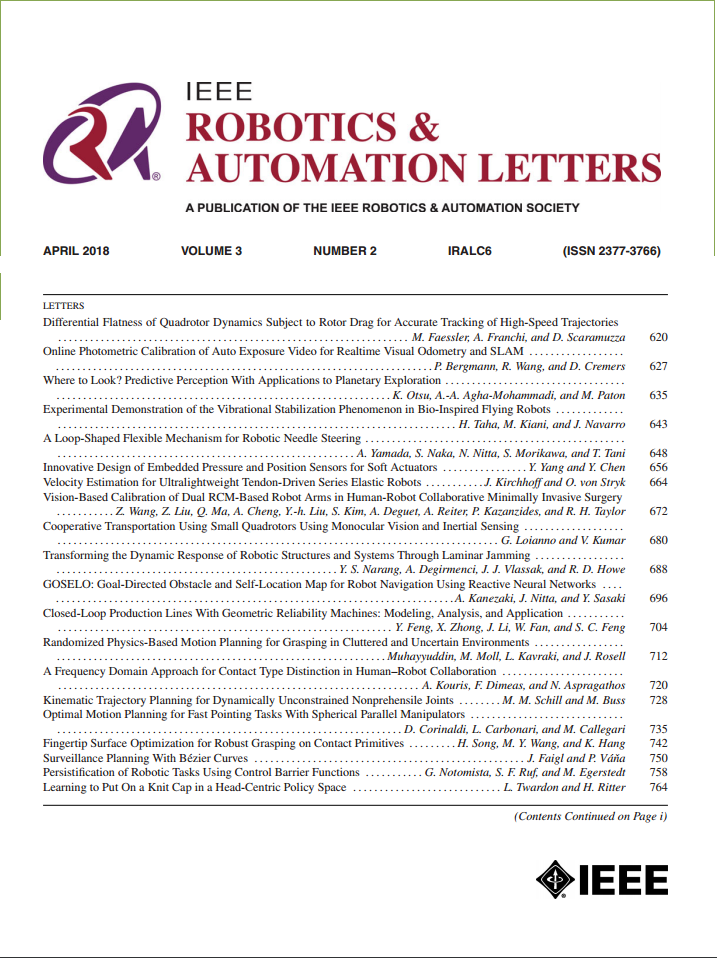面向互联自动驾驶汽车的通用服务功能卸载框架
IF 4.6
2区 计算机科学
Q2 ROBOTICS
引用次数: 0
摘要
功能卸载是一种很有前途的解决方案,通过分布式服务的形式在本地和远程计算设备之间分配计算任务,解决了联网自动驾驶汽车(cav)或其他自主机器人在计算能力和可用能量方面的限制。本文提出了一个通用的函数卸载框架,可用于卸载任意一组计算任务,重点是自动驾驶。为了提供灵活性,功能卸载框架被设计成包含不同的卸载决策制定算法和服务质量(QoS)需求,这些需求可以根据cav的不同场景或目标进行调整。在适用性方面,我们提出了一种高效的基于位置的方法,在这种方法中,任务是在本地处理还是远程处理取决于CAV的位置。我们将提出的框架应用于面向服务的轨迹规划用例,将自动驾驶汽车的轨迹规划任务卸载到多访问边缘计算(MEC)服务器上。在仿真和实际应用中进行了评价。验证了函数卸载框架在保证轨迹规划QoS的同时提高了自动驾驶飞行器的计算效率的潜力。此外,仿真结果还显示了该框架对多个自动驾驶汽车同时卸载请求的各种场景的适应性。本文章由计算机程序翻译,如有差异,请以英文原文为准。
A Generic Service-Oriented Function Offloading Framework for Connected Automated Vehicles
Function offloading is a promising solution to address limitations concerning computational capacity and available energy of Connected Automated Vehicles (CAVs) or other autonomous robots by distributing computational tasks between local and remote computing devices in form of distributed services. This paper presents a generic function offloading framework that can be used to offload an arbitrary set of computational tasks with a focus on autonomous driving. To provide flexibility, the function offloading framework is designed to incorporate different offloading decision making algorithms and quality of service (QoS) requirements that can be adjusted to different scenarios or the objectives of the CAVs. With a focus on the applicability, we propose an efficient location-based approach, where the decision whether tasks are processed locally or remotely depends on the location of the CAV. We apply the proposed framework on the use case of service-oriented trajectory planning, where we offload the trajectory planning task of CAVs to a Multi-Access Edge Computing (MEC) server. The evaluation is conducted in both simulation and real-world application. It demonstrates the potential of the function offloading framework to guarantee the QoS for trajectory planning while improving the computational efficiency of the CAVs. Moreover, the simulation results also show the adaptability of the framework to diverse scenarios involving simultaneous offloading requests from multiple CAVs.
求助全文
通过发布文献求助,成功后即可免费获取论文全文。
去求助
来源期刊

IEEE Robotics and Automation Letters
Computer Science-Computer Science Applications
CiteScore
9.60
自引率
15.40%
发文量
1428
期刊介绍:
The scope of this journal is to publish peer-reviewed articles that provide a timely and concise account of innovative research ideas and application results, reporting significant theoretical findings and application case studies in areas of robotics and automation.
 求助内容:
求助内容: 应助结果提醒方式:
应助结果提醒方式:


